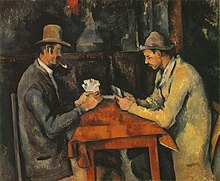Partner games
Under the technical term partner games, game pedagogy summarizes all games in which two players form a game community. The singular designation partner game is used for a single game in this category of games.
term
The term partnership describes a social relationship between two people. Such a two-way relationship is constituted in the so-called partner games with the mutual assignment of two players in the sense of the game idea . Partner games are differentiated from group games in that other players cooperate with each other in the game. The term does not imply that both playing partners act exclusively with one another, i.e. belong to the same playing party. It also includes the option of two players competing against each other. It simply means that two players form a syndicate.
Organizational form
The partner games are a combination of games that have a certain form of organization in common, the breakdown according to two players. Because of its practical relevance, the breakdown by person is preferred in game collections and in everyday gaming practice. Partner games are playing systematically in a row with other breakdowns by people such as the group matches , the season games , the party games or team games . The organizational assignment of the players can be methodological, but also psychological or pedagogical. Accordingly, it can be used purely formally for technical teaching, but also for mutual support or community building. Cooperative forms of play generally tend to form partners. Cooperation can also take place in groups, party or team formations, i.e. in a broader sense.
Partnerships in the form of communities of two can come together for individual activities, but also within larger play groups. They differ from party games or team games in that they are about “partners” in their own field or team and “opponents” in the other field or team.
Examples
Partner games can be found in almost all game genres . The following game forms can be named as examples:
Movement games

Little games such as “horse and rider”, “kangaroo”, “cancer”, “flying fish”, “wheelbarrow” or “gym wheel” are forms of play in which a play partnership is formed between an adult and a child or between two children. Movement games with a partner require physical closeness and the willingness to jointly design movements. The attraction of a partner game can exist alongside the cooperation of a cooperative game , but also against one another in a fighting game . It is essential that two people play together under one game idea .
Card games
Under the game genre of games can be found, such as in the group of card games are also many forms of games that are designed as a partner games:
In Schafkopf , two players play as partners against the other two, who also form a partnership. While the partners in the so-called Deutsches Schafkopf and Bridge are fixed from the start of the game, in the Bavarian Schafkopf or Doppelkopf , for example, the partnerships are only determined during the course of the game. Also the Tichu is a typical partner game, cooperate in pairs in which four players together.
Adventure games
Adventure games draw their charm from the experience of dangerous situations. The courage required is often easier to find with the support of a partner. Dealing with risky tasks together can increase attraction and motivation. It increases the expectation of success and thus the willingness to get involved in this fearful category of play. Adventure games with a partner can be found in large numbers in the relevant game collections, for example by Gilsdorf and Kistner.
Erotic games
In terms of system theory, partner games in the sense of sex games also belong to the category of partner games. However, like erotic role play , they are usually not recorded and collected in game literature, but dealt with in the relevant erotic literature and under the topic of sexual practices . The situation is similar with the so-called doctor games , which are characteristic of a child's self-discovery phase, but do not appear in game collections for obvious reasons of child protection .
Play-educational importance
There can be different reasons and different intentions for playing games with partner assignment: partner games can initially only comply with one intention that is stipulated by the rules of the game and that structures the game. You can e.g. They can be used, for example, in preparation for training for the major sports games, but also as an organizational and methodological measure. Finally, didactic objectives can also determine the decision to form partnerships: In game education, partner games function as the initial stage in the learning process of integration into a play group because of the still relatively simple reference structure to only one other player. This is especially important when playing with small children and teaching compliance with the rules when playing. The partner assignment can also be based on learning psychological considerations. In partner games, direct communication and cooperation between two players is required. The players have to observe each other, coordinate with each other, help each other. The body of the other player can become the impulse to play. The facial expressions, gestures, the game behavior of the other person, the mutual exchange, the game ideas and activities developed together can contribute to the attractiveness of the event. Under the guidance of a knowledgeable game master, partner games can develop opportunities to contribute to a better mutual understanding and the promotion of interpersonal behavior.
literature
- Deborah Addington: Fantasy Made Flesh. The Essential Guide To Erotic Roleplay. Greenery Press, Emeryville 2003.
- Yvonne Bechheim: Successful cooperation games. 4th edition, Limpert Verlag, Wiebelsheim 2013.
- Ekkehard Blumenthal: Cooperative movement games. 2nd expanded edition. Verlag Karl Hofmann, Schorndorf 1993.
- Barbara Burian-Langegger (Ed.): Doctor games, the sexuality of the child . Picus, Vienna 2005, ISBN 3-85452-495-1 .
- Irene Flemming, Jürgen Fritz: Cooperative games. Mainz 1995, ISBN 3-786-71843-1 .
- Rüdiger Gilsdorf, Günter Kistner: Cooperative adventure games. Practical help for schools and youth work. 2nd corrected edition, Kallmeyer Verlag, Seelze-Velber 1996.
- Terry Orlick: New Cooperative Games. More than 200 competitive free games for kids and adults . 4th edition, Weinheim and Basel 1996.
- Siegbert A. Warwitz, Anita Rudolf: From the sense of playing. Reflections and game ideas . 4th edition, Baltmannsweiler 2016, ISBN 978-3-8340-1664-5 .
Web links
Individual evidence
- ^ Irene Flemming, Jürgen Fritz: Cooperative games. Mainz 1995
- ^ Siegbert A. Warwitz, Anita Rudolf: Partner games without device , In: Dies .: From the sense of playing. Reflections and game ideas . 4th updated edition, Baltmannsweiler 2016, pp. 242–244
- ^ Ekkehard Blumenthal: Cooperative movement games. 2nd expanded edition, Verlag Karl Hofmann, Schorndorf 1993
- ↑ Siegbert A. Warwitz, Anita Rudolf: Playing adventure - adventure games , In: Dies .: From the sense of playing. Reflections and game ideas . 4th updated edition, Baltmannsweiler 2016, pp. 64–69
- ^ Rüdiger Gilsdorf, Günter Kistner: Cooperative adventure games. Practical help for schools and youth work. 2nd corrected edition, Kallmeyer Verlag, Seelze-Velber 1996
- ↑ Deborah Addington: Fantasy Made Flesh. The Essential Guide To Erotic Roleplay. Greenery Press, Emeryville 2003
- ↑ Barbara Burian-Langegger (Ed.): Doctor games, the sexuality of the child . Picus, Vienna 2005
- ^ Siegbert A. Warwitz, Anita Rudolf: Body and players as game impulses , In: Dies .: From the sense of playing. Reflections and game ideas . 4th updated edition, Baltmannsweiler 2016, pp. 241–246
- ↑ Yvonne Bechheim: Successful cooperation games. 4th edition, Limpert Verlag, Wiebelsheim 2013
